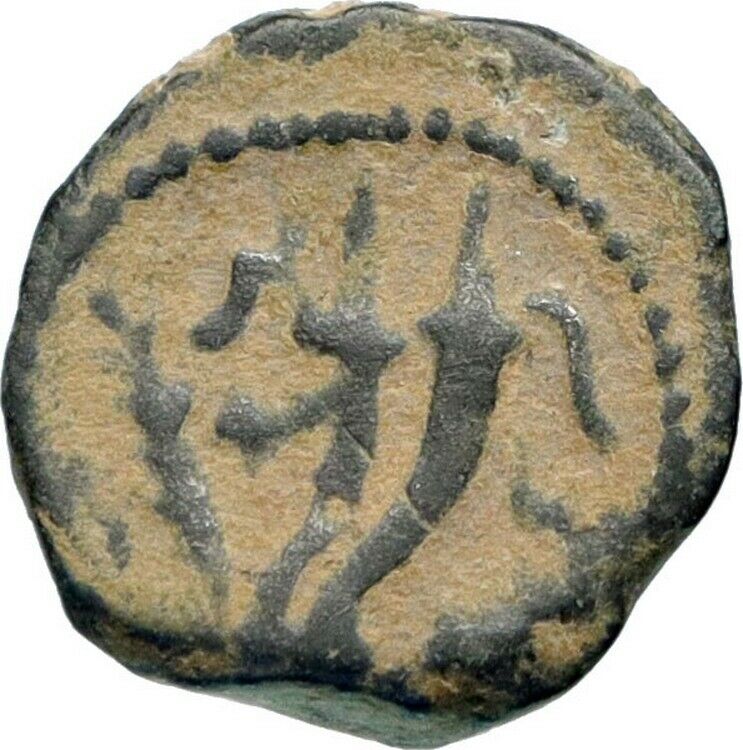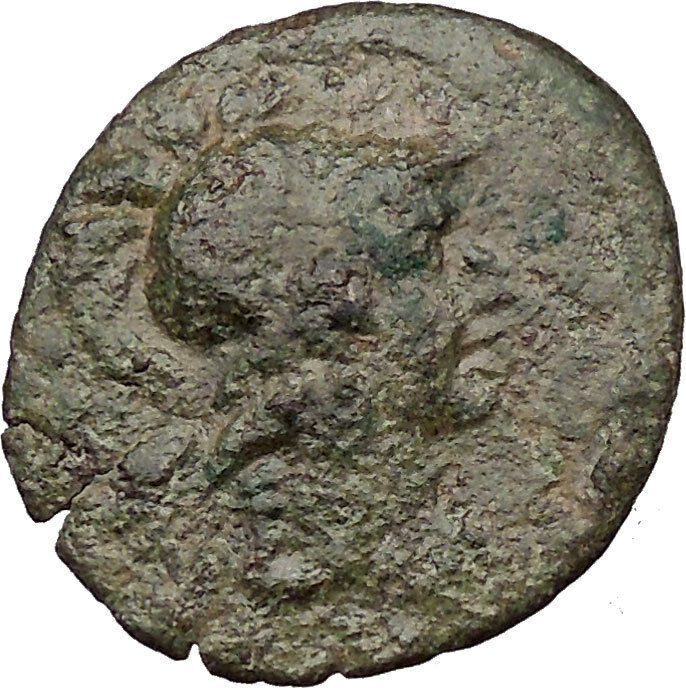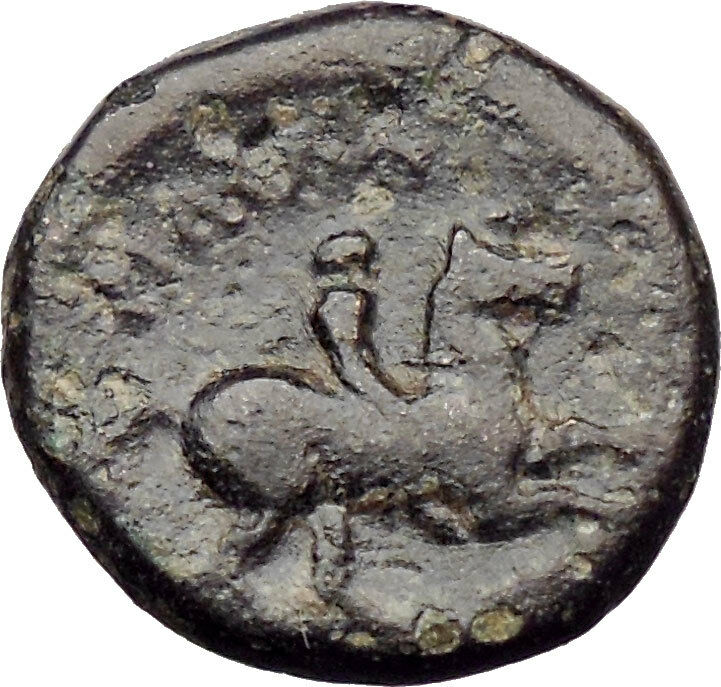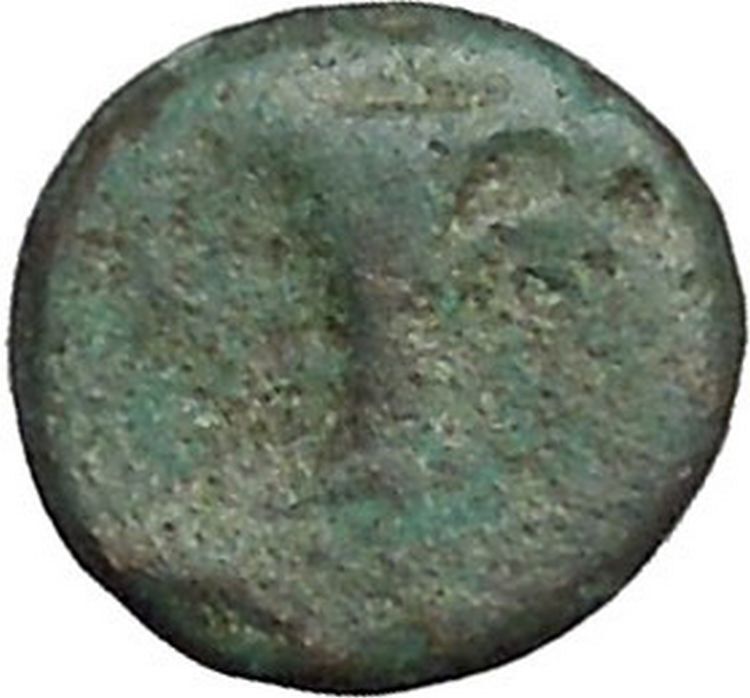|
Greek city of Ainos in Thrace
Bronze 16mm (5.01 grams) Struck circa 280-200 B.C.
Reference: Sear 1574 var.
Head of Hermes left, wearing close-fitting petasos.
Caduceus; A-I / N-I / O-N in field.
Ainos was a prosperous city and trading center, situated on a peninsula at the mouth of the river Hebros.
You are bidding on the exact item pictured, provided with a Certificate of Authenticity and Lifetime Guarantee of Authenticity.
 Hermes is the great messenger of the gods in Greek mythology and additionally as a guide to the Underworld. Hermes was born on Mount Cyllene in Arcadia. An Olympian god, he is also the patron of boundaries and of the travelers who cross them, of shepherds and cowherds, of the cunning of thieves and liars, of orators and wit, of literature and poets, of athletics and sports, of weights and measures, of invention, and of commerce in general. His symbols include the tortoise, the rooster, the winged sandals, the winged hat, and the caduceus (given to him by Apollo in exchange for the lyre). Hermes is the great messenger of the gods in Greek mythology and additionally as a guide to the Underworld. Hermes was born on Mount Cyllene in Arcadia. An Olympian god, he is also the patron of boundaries and of the travelers who cross them, of shepherds and cowherds, of the cunning of thieves and liars, of orators and wit, of literature and poets, of athletics and sports, of weights and measures, of invention, and of commerce in general. His symbols include the tortoise, the rooster, the winged sandals, the winged hat, and the caduceus (given to him by Apollo in exchange for the lyre).
Symbols of Hermes were the palm tree, turtle, rooster, goat, the number four, several kinds of fish, incense. Sacrifices involved honey, cakes, pigs, goats, and lambs.
In the Roman adaptation of the Greek religion (see interpretatio romana), Hermes was identified with the Roman god Mercury, who, though inherited from the Etruscans, developed many similar characteristics, such as being the patron of commerce.
The Homeric hymn to Hermes invokes him as the one “of many shifts (polytropos), blandly cunning, a robber, a cattle driver, a bringer of dreams, a watcher by night, a thief at the gates, one who was soon to show forth wonderful deeds among the deathless gods.”
He protects and takes care of all the travelers, miscreants, harlots, old crones and thieves that pray to him or cross his path. He is athletic and is always looking out for runners, or any athletes with injuries who need his help.
Hermes is a messenger from the gods to humans, sharing this role with Iris. An interpreter who bridges the boundaries with strangers is a hermeneus. Hermes gives us our word “hermeneutics”, the study and theory of interpretation. In Greek a lucky find was a hermaion. Hermes delivered messages from Olympus to the mortal world. He wears shoes with wings on them and uses them to fly freely between the mortal and immortal world. Hermes was the second youngest of the Olympian gods, being born before Dionysus.
Hermes, as an inventor of fire, is a parallel of the Titan, Prometheus. In addition to the lyre, Hermes was believed to have invented many types of racing and the sports of wrestling and boxing, and therefore was a patron of athletes.
According to prominent folklorist Yeleazar Meletinsky, Hermes is a deified trickster. Hermes also served as a psychopomp, or an escort for the dead to help them find their way to the afterlife (the Underworld in the Greek myths). In many Greek myths, Hermes was depicted as the only god besides Hades, Persephone, Hecate, and Thanatos who could enter and leave the Underworld without hindrance.
Hermes often helped travelers have a safe and easy journey. Many Greeks would sacrifice to Hermes before any trip.
In the fully-developed Olympian pantheon, Hermes was the son of Zeus and the Pleiade Maia, a daughter of the Titan Atlas. Hermes’ symbols were the cock and the tortoise, and he can be recognized by his purse or pouch, winged sandals, winged cap, and the herald’s staff, the kerykeion. The night he was born he slipped away from Maia and stole his elder brother Apollo’s cattle.
Aenus modern Enez in Turkey, was an ancient Greek city on the southeastern coast of Thrace. Formerly called Poltyobria (or Poltymbria), it was located near the mouth of the Hebrus River, not far from the Melas Gulf (modern Gulf of Saros), which is formed by the Thracian Chersonesus to the east. The city was said to be founded (or at least settled) by Aeolian migrants from Lesbos.
Aenus is mentioned by several ancient authors (e.g., Homer, Strabo, Apollodorus, Thucydides), and makes several appearances in Greek mythology. Its mythical and eponymous founder was said to be Aeneus, a son of the god Apollo and father of Cyzicus. Another mythical ruler, named Poltys, son of Poseidon, entertained Heracles when he came to Aenus. On that occasion, Heracles slew Poltys’ insolent brother Sarpedon on the beach of Aenus. According to Strabo, Sarpedon is the name of the coastline near Aenus, so both Poltys and Sarpedon would appear to be eponyms.
In the Iliad, Homer mentions that the leaders of Troy’s Thracian allies, Acamas and Peiros, came from Aenus.
|





 Hermes is the great messenger of the gods in Greek mythology and additionally as a guide to the Underworld. Hermes was born on Mount Cyllene in Arcadia. An Olympian god, he is also the patron of boundaries and of the travelers who cross them, of shepherds and cowherds, of the cunning of thieves and liars, of orators and wit, of literature and poets, of athletics and sports, of weights and measures, of invention, and of commerce in general. His symbols include the tortoise, the rooster, the winged sandals, the winged hat, and the caduceus (given to him by Apollo in exchange for the lyre).
Hermes is the great messenger of the gods in Greek mythology and additionally as a guide to the Underworld. Hermes was born on Mount Cyllene in Arcadia. An Olympian god, he is also the patron of boundaries and of the travelers who cross them, of shepherds and cowherds, of the cunning of thieves and liars, of orators and wit, of literature and poets, of athletics and sports, of weights and measures, of invention, and of commerce in general. His symbols include the tortoise, the rooster, the winged sandals, the winged hat, and the caduceus (given to him by Apollo in exchange for the lyre).




